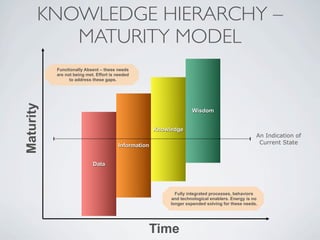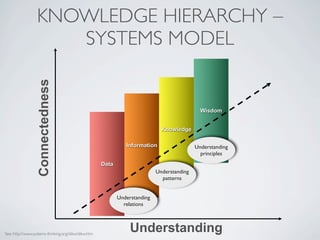Knowledge Hierarchies
- 1. KNOWLEDGE HIERARCHY – MATURITY MODEL Functionally Absent – these needs are not being met. Effort is needed to address these gaps. Maturity Wisdom Knowledge An Indication of Current State Information Data Fully integrated processes, behaviors and technological enablers. Energy is no longer expended solving for these needs. Time
- 2. KNOWLEDGE HIERARCHY – SYSTEMS MODEL Connectedness Wisdom Knowledge Information Understanding principles Data Understanding patterns Understanding relations See: http://www.systems-thinking.org/dikw/dikw.htm Understanding
Editor's Notes
- The poet T.S. Eliot was the first to mention the "DIKW hierarchy" without even calling it by that name. In 1934 Eliot wrote in "The Rock"[5]: Where is the Life we have lost in living? Where is the wisdom we have lost in knowledge? Where is the knowledge we have lost in information? http://www-personal.si.umich.edu/~nsharma/dikw_origin.htm Maslow’s Hierarchy of Needs – on its side DIKW (See Wikipedia) Data-Information-Knowledge-Wisdom One variation DIKS: Data-Information-Knowledge-Strategy Data Facts, measurements is analyzed and/or connected to provide Information Facts, intelligence when acted upon becomes Knowledge A range of contextual information and experiences when reflected upon or analyzed becomes Wisdom Enables smart decisions Explicit KM DIKW are codified: recorded in text, audio, video, computer file or another capture method and systematically arranged When knowledge and wisdom are codified they become information Tacit KM DIKW are implicit – assumed, understood; internal – experiential, personal A person can combine new data with past training to internally generate knowledge People-to-people interactions, such as sharing, learning, and mentoring


